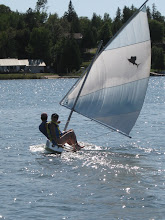I have just come out of an extremely busy vocal period of time. It has been fairly strenuous and I am now paying for it. Luckily I have a little bit of down time, meaning no performances for a while, of course I still have seven and a half hours of rehearsal a week, what would I do with my life if not for that. Not wake up at 6 to do school work?
My voice teacher asked me how I felt with the Schostakovich piece I sang for the Jewish Music concert. After mumbling something about the inadequacy of one week to prepare a Schostakovich piece in Russian I came up with the real answer. I feel as if I sang that piece on my "fake voice", the sheen that lives on top of my real voice that I sing with when my real voice is on vacation.
How to explain this...
I do a tremendous amount of choral singing (something that will certainly be changing next year, I love it but I need to not do this to myself). Choral singing inherently requires a different manner of singing than solo singing. This is a huge struggle for everyone who pursues both solo and choral singing. I tend to control too much in my throat in choral singing, straighten and darken my tone, this is because no matter how much we attempt to flee from the little boy sound, that is the tone quality that so much choral music was written for boys. (speaking of which check out "I am the day" creepy!, also ask me to do my choir boy voice for you some time...years of emulating that song has created a monster)
Anyhow the larynx comes up and I tend to cover my mouth, this is my default I'm tired and will just do this to promote blending. However, the "problem" is that I can call this fake voice in for "real" singing as well. Just push it up and out of the system. The thing is many people can't tell, they still come and ask me to sing them to sleep (yes that has happened more than once).
Real singing is an effort of the lower body, everything is engaged and you feel invigorated all over afterward. The analogy that I frequently use is that your belly is a submarine and all of the business on top is just the periscope...good for looking out of, but not much else. Another frequently used analogy is that all sound is supported below, and then happens above your top teeth. Your head is like a house of mirrors that reflects the sound but does not hinder it.
So that's what I did in my voice lesson, tried to re-find my voice. It worked fairly well, I just have to keep it up. Interestingly, "real" singing sounds quieter to me in my head, but from the out side I'm told it's louder than "fake" singing. I guess that's because when I'm singing poorly the sound gets caught up in my mouth and such and is louder to me. So if I look lax tongued and air headed, I'm probably doing something right...unless I'm taking a test, then we have a problem.
Roblox Boys Cothes Free Template
4 years ago
